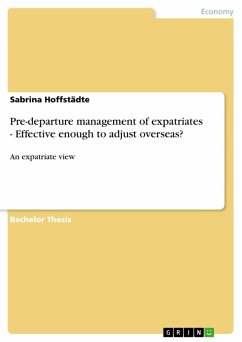Essay from the year 2003 in the subject Leadership and Human Resource Management - Miscellaneous, grade: 2, University of Manchester, language: English, abstract: The workplace has changed the last years. The employees enjoy more career opportunities. Their acceptance of an international assignment depends on a large degree on the organisation's compensation policy. The expatriate compensation policy should follow the same principles as the domestic compensation in order to attract, retain and motivate employees to fulfil the expectations of the company within a determined budget (Jagatsing, 2000). The expatriate defined means "an employee of one company who is sent for a limited period of time from his or her place (country) of domestic employment to a place of assignment, for the purpose of working for and providing services to a receiving company." (ASN, Services for Expatriates, March 2004). Compensation is "the total remuneration, in cash or in kind, payable by an enterprise to an employee in return for work done by the latter during the accounting period."(United Nations Statistic Division, March 2004). The difficulties of the compensation of an expatriate lie in different economic systems, development models, political and institutional contexts, different pension systems, taxation issues and different cultures and traditions. Expatriate compensation is very complex and a challenging issue. Black (1991 in Suutari and Tornikoski, 2001) argued that 77 per cent of the expatriate managers were dissatisfied with their salaries and their compensation package. Considering these difficulties and differences in the international context the Human Resource Manager has to ensure that the compensation is fair and that it is also cost-effective in today's global market place.
Dieser Download kann aus rechtlichen Gründen nur mit Rechnungsadresse in A, B, BG, CY, CZ, D, DK, EW, E, FIN, F, GR, HR, H, IRL, I, LT, L, LR, M, NL, PL, P, R, S, SLO, SK ausgeliefert werden.









